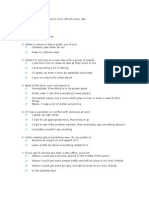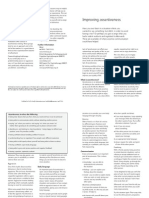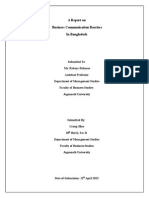Parker Team Player For Grad Students
Parker Team Player For Grad Students
Uploaded by
Ravnish WesleyCopyright:
Available Formats
Parker Team Player For Grad Students
Parker Team Player For Grad Students
Uploaded by
Ravnish WesleyOriginal Description:
Original Title
Copyright
Available Formats
Share this document
Did you find this document useful?
Is this content inappropriate?
Copyright:
Available Formats
Parker Team Player For Grad Students
Parker Team Player For Grad Students
Uploaded by
Ravnish WesleyCopyright:
Available Formats
Whats Your Team Player Style?
Dal Sohal, MA
Student Learning Commons
TEAM PLAYER
Brainstorm words and phrases that describe a team player
Parker Team Player
So What Does it Mean?
What is it?
A tool developed by Glenn Parker, to help you
identify the communication style you most often
apply to team work. The results can help you identify
ways to increase your effectiveness in a team.
About the Parker Team Player survey
There is no way to psych out the survey;
your first impression is probably the best
answer.
Go through the survey rapidly
You cant fail the survey or even get a bad
score
You get to keep the booklet after the
workshop!
Now
Take the survey
Understanding Your PTPS Scores
Your highest score total in the last row is
considered your Primary Team Player Style.
The range of scores is 18 72.
A score in the high 50s or low 60s means you
are clearly committed to that style.
If your lowest score, Least Active Team Player
Style, is in the low 30s or high 20s, you
probably clash with a team member for whom
its their primary style.
4 Team Player Styles
Contributor is task oriented
Collaborator is goal directed
Communicator is process focused
Challenger questions the goals and processes
of the team
Parker Team Player
So What Does it Mean?
_____________________________________________________________________________
What is the best style?
There is no right or best style. All four styles
can be effective under the right circumstances
In fact, the most effective team players are able to
use the strengths of ALL styles, as required by the
team
Each of us has the capacity to be effective team
player
Contributor task oriented
__________________________________________________________________________
Gets team to focus on short-term tasks.
Likes detailed plan of action tactical
Provides data and information likes to analyze and study
before moving ahead
Likes to share knowledge and skills often good at training
others
Expects others to share their high expectations of quality work
Dependable and timely
Collaborator goal oriented
__________________________________________________________________________
Gets team to focus on overall mission, vision and long
term outcomes
Helpful in early stages of group formation, when the
team needs to become clear about its overall
purpose
Helps team understand how its mission fits into the
larger strategy of an organization
Willing to pitch in and do what it takes to reach the
teams goal
Communicator process focused
______________________________________________________________________________
Cares about how people work and communicate together
with each other
Often good facilitators & consensus builders; encourage
participation and inclusion, resolve conflict
Often bring a sense of humour and help foster a positive team
climate
Ensures team members get recognition: likely to plan social
activities and celebrations
Challenger questions goals and processes
___________________________________________________________________________
Questions what the team is doing and how it is
working on its tasks, willing to disagree with the
leader
Asks tough questions
Pushes the team to be more creative and innovative
Suggests the team take some risks
In your Primary Team Player Style Group
_____________________________________________________________________________
Think about a time when your team style
helped your group. Share the example with
others of your same team style.
Parker Team Player Styles
PROBLEMS
Occur when team players take their strengths to excess or
become intolerant of members with other styles
When you get ineffective
What does the Contributor do that makes
him or her ineffective?
What happens when a Collaborator goes into
overdrive?
What are some weaknesses of the
Communicator?
What are some of the ineffective behaviours
of the Challenger?
Contributor task oriented
__________________________________________________________________________
Can get too focused on detail and forget the
overall purpose of the team
Can impose too much data on the team; can
over analyze a problem, dismissing proposed
solutions as not good enough
Can spend too much time working on
unhelpful or useless tasks
Collaborator goal directed
_________________________________________________________________________________
Can be so visionary that they overlook practical
implementation and important details
Can be so focused on future, they overlook the work
that needs to be done now
Can fail to include others in the development of the
teams purpose
Communicator process focused
______________________________________________________________________________
Can focus so much on ensuring people get along and
enjoy themselves that they lose sight of groups
purpose and goals
Can forget that we dont form teams for people to
get along, we form them to accomplish a task, and
sometimes constructive conflict can generate good
results
Can avoid conflict to excess
Challenger questions goals and processes
___________________________________________________________________________
Can push too far, argue long after consensus has
been reached
Can lose their effectiveness, because people stop
listening to them as they appear in constant
opposition to the teams efforts
Can sometimes pick a fight, just because they enjoy
disagreement, not because they truly disagree with
the groups decisions.
An Ef f ec t i ve Team
I ncl udes Al l Four St yl es
Contributor
Communicator Challenger
Collaborator
Anal yze Your Team
1. Look for style overload
2. One style is missing
Anal yzi ng Your Team
Name/Style Contributor Collaborator Communicator Challenger
Ben 50 42 49 39
Emily 48 40 48 44
Vince 49 43 42 46
Jan 59 46 30 45
Lynn 49 42 46 43
Helene 44 55 36 45
Develop a Plan (p. 18)
___________________________________________________________________________
My main strengths as a team player
My strengths show up on the job in the following
ways
My potential for becoming an ineffective team player
show up on the job in the following ways
I can become a more effective team player by doing
the following
You might also like
- HR Policies Followed in BarclaysDocument17 pagesHR Policies Followed in BarclaysNitika Gupta100% (1)
- Colouring in For Emotional ClarityDocument6 pagesColouring in For Emotional ClarityRoy RoyNo ratings yet
- The Four Tendencies Quiz: Detailed Report: RebelDocument4 pagesThe Four Tendencies Quiz: Detailed Report: RebelA Mermaid SongNo ratings yet
- Five Tips To Inspire First-Time Leaders (2016) by Lawrence - MAY 2020Document12 pagesFive Tips To Inspire First-Time Leaders (2016) by Lawrence - MAY 2020Yoseph Haziel IsraelNo ratings yet
- C Engleza Scris Var 07Document4 pagesC Engleza Scris Var 07Radulescu Andrei100% (1)
- Accountability WorksheetDocument11 pagesAccountability Worksheetatgreat25No ratings yet
- How Emotionally Intelligent Are YouDocument3 pagesHow Emotionally Intelligent Are YouMaximilian DramescuNo ratings yet
- Self-Esteem Balloon Lesson PlanDocument3 pagesSelf-Esteem Balloon Lesson Planapi-447679841No ratings yet
- DiscselfsamplereportDocument38 pagesDiscselfsamplereportapi-280199986No ratings yet
- 3.0SampleTTiReport Trust Index Report SampleDocument15 pages3.0SampleTTiReport Trust Index Report SampleCoco MaciNo ratings yet
- Summary Book Communicating at Work Communication Chapters 1 5 LecturesDocument18 pagesSummary Book Communicating at Work Communication Chapters 1 5 LecturesRayhanNo ratings yet
- CMN 412 Syllabus S 16Document8 pagesCMN 412 Syllabus S 16Carlos GuiterizNo ratings yet
- Behavioral Learning TheoriesDocument34 pagesBehavioral Learning TheoriesJenevyG.Manuel100% (3)
- Understanding Emotional Intelligence& Conflict Resolution: Facilitator Gulzar KhalfanDocument27 pagesUnderstanding Emotional Intelligence& Conflict Resolution: Facilitator Gulzar KhalfanParag ShrivastavaNo ratings yet
- Comm Self AssessmentDocument7 pagesComm Self AssessmentKevin CoolNo ratings yet
- Belbin's Team Roles - Lec 4Document5 pagesBelbin's Team Roles - Lec 4Tharushi DiyanaNo ratings yet
- UNSTUCK Relationships at WorkDocument1 pageUNSTUCK Relationships at WorkNeda KahnNo ratings yet
- Unlock Your Motivation - TeensWithADHDDocument9 pagesUnlock Your Motivation - TeensWithADHDLucia EspinozaNo ratings yet
- Emotional Intelligence Digital Workbook - Class VersionDocument38 pagesEmotional Intelligence Digital Workbook - Class VersionmanickajaminNo ratings yet
- Seven Stories Exercise WorksheetDocument6 pagesSeven Stories Exercise WorksheetBelinda MichelleNo ratings yet
- Team Strengths GridDocument11 pagesTeam Strengths GridsneakerheadNo ratings yet
- Building Trust & Psychological Safety in TEAMS - Ikeja SlideDocument24 pagesBuilding Trust & Psychological Safety in TEAMS - Ikeja SlidejosephakhiromeNo ratings yet
- Having Difficult ConversationsDocument31 pagesHaving Difficult ConversationsTom Tot100% (1)
- Slides Social InteractionsDocument17 pagesSlides Social InteractionsFernandaNo ratings yet
- Personal Values InventoryDocument2 pagesPersonal Values InventoryMichael FrenchNo ratings yet
- Via Inventory of StrengthsDocument29 pagesVia Inventory of StrengthsSalbia Riasat100% (2)
- Psych 162: Personality TestingDocument8 pagesPsych 162: Personality TestingSteffi PerillaNo ratings yet
- Difficult ConversationsDocument6 pagesDifficult Conversationsapi-377451878No ratings yet
- Core Values Worksheet 1222Document7 pagesCore Values Worksheet 1222austintx360No ratings yet
- Dare To LeadDocument15 pagesDare To Leadsamesoul02No ratings yet
- I Attract Unconditional LoveDocument2 pagesI Attract Unconditional LoveCortney SmithNo ratings yet
- Emotional Intelligence - Session 1 PDFDocument4 pagesEmotional Intelligence - Session 1 PDFAnderson CastroNo ratings yet
- Difficult ConversationsDocument3 pagesDifficult ConversationsMarioIgnacioPinoNo ratings yet
- Challenging Questions WorksheetDocument3 pagesChallenging Questions WorksheetmelissaNo ratings yet
- Personality Assessment - Carreer TestDocument7 pagesPersonality Assessment - Carreer TestboranscribdNo ratings yet
- Talent Theme CardsDocument18 pagesTalent Theme CardsBudi SetiawanNo ratings yet
- Having Difficult ConversationsDocument31 pagesHaving Difficult ConversationsTetiana Paientko100% (1)
- Executive Functioning Skills DevelopmentDocument4 pagesExecutive Functioning Skills DevelopmentDr Devyna LembardNo ratings yet
- With Jay Shetty: Developing A Growth MindsetDocument3 pagesWith Jay Shetty: Developing A Growth MindsetMeghana yadavNo ratings yet
- The Enneagram Coach Challenge WorkbookDocument21 pagesThe Enneagram Coach Challenge WorkbookSlocoj91No ratings yet
- Coaching For Performance Executive WorkshopDocument33 pagesCoaching For Performance Executive Workshopedgard moralesNo ratings yet
- 01 NLD - AbovePlant - Workbook - Final - 24 JanDocument49 pages01 NLD - AbovePlant - Workbook - Final - 24 JanIulian BarbuNo ratings yet
- Interpersonal Skills ExercisesDocument25 pagesInterpersonal Skills ExercisesHasnain Mohammadi100% (1)
- EQ. QuestionnaireDocument7 pagesEQ. QuestionnaireGokul RungtaNo ratings yet
- How Emotionally Intelligent Are You - Career Skills FromDocument8 pagesHow Emotionally Intelligent Are You - Career Skills FromFelipe Hoyos TabordaNo ratings yet
- Ego Busting FrameworkDocument3 pagesEgo Busting Frameworks_duttNo ratings yet
- Layer 1 Desire WorkbookDocument4 pagesLayer 1 Desire WorkbookTezcatzinNo ratings yet
- Breaking The Vicious Cycle 1Document8 pagesBreaking The Vicious Cycle 1Yana Yarema100% (1)
- Kelly Anger PDF Care For MyselfDocument17 pagesKelly Anger PDF Care For MyselfQu XaNo ratings yet
- Giver ReportDocument4 pagesGiver ReportDerek Banas100% (1)
- Belbin InventoryDocument8 pagesBelbin InventoryOsemhen Akhibi100% (1)
- 8 Breaths Conversation Design GuideDocument16 pages8 Breaths Conversation Design GuideTom YatesNo ratings yet
- Life Plan Goals 5 Year Goals Daily GoalsDocument2 pagesLife Plan Goals 5 Year Goals Daily Goals33breezeNo ratings yet
- Facilitating Difficult ConversationsDocument9 pagesFacilitating Difficult ConversationsswapneelbawsayNo ratings yet
- Effective Communications Development Guide PDFDocument14 pagesEffective Communications Development Guide PDFbk100% (1)
- Improving AssertivenessDocument2 pagesImproving Assertivenesspedda60100% (1)
- Right or Kind?: Navigating The Soft Skills RevolutionDocument20 pagesRight or Kind?: Navigating The Soft Skills RevolutionMescasaNo ratings yet
- "13 Reasons Why" Discussion GuideDocument47 pages"13 Reasons Why" Discussion GuideАнгелина ИполитоваNo ratings yet
- Retreat Made EasyDocument6 pagesRetreat Made EasyMarianaNo ratings yet
- Leadership Exercise SheetsDocument10 pagesLeadership Exercise SheetsElias HernándezNo ratings yet
- Strengths - Self Rating ScaleDocument3 pagesStrengths - Self Rating ScalealexandraberteaNo ratings yet
- A Practical Guide to Leadership: Be Inspired by Great LeadersFrom EverandA Practical Guide to Leadership: Be Inspired by Great LeadersRating: 5 out of 5 stars5/5 (1)
- Collaborative Problem Solving Group A Complete Guide - 2020 EditionFrom EverandCollaborative Problem Solving Group A Complete Guide - 2020 EditionNo ratings yet
- Be a Better Boss: Learn to build great teams and lead any organization to successFrom EverandBe a Better Boss: Learn to build great teams and lead any organization to successNo ratings yet
- Harmonic Inquiry: A Supervision Technique For Developing Selves-AwarenessDocument10 pagesHarmonic Inquiry: A Supervision Technique For Developing Selves-AwarenessHome accountNo ratings yet
- District Science Fair Activity Completion ReportDocument5 pagesDistrict Science Fair Activity Completion ReportMa Fatima Christy MesaNo ratings yet
- Assignment 2Document18 pagesAssignment 2Muhammad JunaidNo ratings yet
- Copy TestingDocument10 pagesCopy TestingArunjeet Singh RainuNo ratings yet
- The Core Essentials of Reality Shifting 1st EditionDocument201 pagesThe Core Essentials of Reality Shifting 1st Editionannanguyen090308No ratings yet
- 2Document9 pages2olivia_le79No ratings yet
- Closing The GapactionplansocialDocument1 pageClosing The Gapactionplansocialapi-363248890100% (1)
- Essential Question RubricDocument1 pageEssential Question Rubricapi-445513635No ratings yet
- Withey (1989) - Predicting Exit Voice Loyalty and NeglectDocument20 pagesWithey (1989) - Predicting Exit Voice Loyalty and NeglectDavid AuNo ratings yet
- Secret of OrgasmDocument2 pagesSecret of Orgasmparthopagol100% (1)
- Tenets of CommunicationDocument3 pagesTenets of CommunicationSofia Cassandra FerreraNo ratings yet
- Health Chapter 23Document36 pagesHealth Chapter 23jchen6271No ratings yet
- Total Innovation ManagementDocument5 pagesTotal Innovation ManagementRomer GesmundoNo ratings yet
- A Study On Consumer Survey Marketing in Three Axis Plate Pro Industry at Karur QuestionariesDocument2 pagesA Study On Consumer Survey Marketing in Three Axis Plate Pro Industry at Karur Questionarieseswari100% (1)
- Why Become A Music TeacherDocument3 pagesWhy Become A Music TeacherJohn AlontagaNo ratings yet
- copy-for-Curriculum-Development 1Document159 pagescopy-for-Curriculum-Development 1Kristine EdquibaNo ratings yet
- Chiltern Edge School Prospectus 2014-15Document4 pagesChiltern Edge School Prospectus 2014-15BluegrasscomsNo ratings yet
- Communicative Approach Language Teaching PDFDocument2 pagesCommunicative Approach Language Teaching PDFStaceyNo ratings yet
- Syifa Fauziah Kamilah-Fpsi PDFDocument121 pagesSyifa Fauziah Kamilah-Fpsi PDFAhmad Zaeri SyaraniNo ratings yet
- Business Communication BarriersDocument9 pagesBusiness Communication BarriersPratikBhowmickNo ratings yet
- Types of Assesment Tools - ReportDocument27 pagesTypes of Assesment Tools - ReportEdel Villanueva100% (1)
- The Effects of Bad Parenting On Children: Antisocial BehaviorDocument16 pagesThe Effects of Bad Parenting On Children: Antisocial BehaviorMinh TrịnhNo ratings yet
- Decision Making Under Uncertainty - FinalDocument21 pagesDecision Making Under Uncertainty - FinalWeng FléursNo ratings yet
- Literature Review GTMDocument2 pagesLiterature Review GTMnikmatul jazilahNo ratings yet
- Yct Level 4 - InfoDocument2 pagesYct Level 4 - InfoJessa Buhay RosellosaNo ratings yet
- Research ProposalDocument12 pagesResearch Proposalapi-315230980No ratings yet

























































































